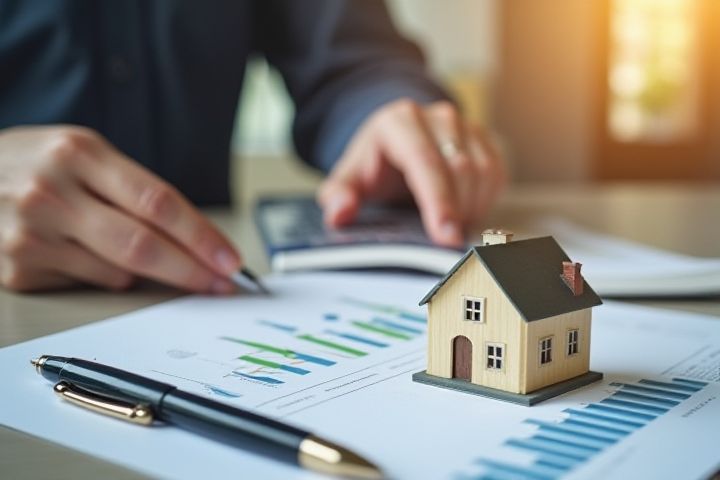
House appraisal value is primarily determined by several key factors, including the property's location, size, condition, and comparable sales in the area. Appraisers evaluate neighborhood characteristics, such as school quality and proximity to amenities, which significantly influence desirability and market value. The home's features, including the number of bedrooms, bathrooms, and any upgrades, play a critical role in the overall appraisal process. Additionally, the current real estate market trends, such as supply and demand dynamics, can affect property values. By understanding these elements, you can better assess what influences your home's appraisal and make informed decisions regarding buying, selling, or refinancing.
What Determines House Appraisal Value
Location and neighborhood
House appraisal value is significantly influenced by location and neighborhood characteristics. Properties in desirable areas, characterized by good schools, low crime rates, and access to amenities such as parks, shopping, and public transport, tend to have higher appraisal values. The neighborhood's overall economic health, including property value trends and local market demand, also plays a critical role. You should consider how the neighborhood's demographics and future development plans could further impact your home's valuation.
Size and square footage
House appraisal value is significantly influenced by size and square footage, as these metrics directly correlate with living space and overall functionality. Larger homes typically offer more bedrooms and bathrooms, accommodating families or individuals seeking additional comfort. Square footage also affects marketability; properties with ample living space often command higher prices, influencing buyer interest. When considering your home's appraisal, remember that these dimensions play a crucial role in establishing its overall value in the real estate market.
Recent comparable sales
Recent comparable sales, often referred to as "comps," significantly influence house appraisal values. Appraisers analyze recently sold properties in your neighborhood that are similar in size, age, and features to determine a fair market value. For instance, if three similar homes sold for an average of $400,000 within the last six months, your property's value may be adjusted accordingly. The condition, upgrades, and specific location of these comparable properties also play a crucial role in establishing an accurate appraisal figure.
Condition of home
The condition of a home significantly influences its appraisal value, as appraisers evaluate various factors such as structural integrity, age, and quality of materials. A well-maintained property with updated systems--like plumbing, electrical, and HVAC--can potentially increase its market value by 10% to 20%. Conversely, signs of neglect, such as peeling paint, water damage, or outdated fixtures, can lead to deductions in appraisal estimates. Ensuring your home is in excellent condition not only enhances its value but also attracts more buyers in the competitive real estate market.
Age and style of house
The age of a house significantly influences its appraisal value, as older homes may possess unique architectural features and historical significance that can enhance appeal. However, newer homes often benefit from modern construction materials and energy-efficient technologies, which can raise their market worth. The style of a house--such as Colonial, Victorian, or Mid-Century Modern--also plays a crucial role, with certain styles commanding higher prices due to their popularity and desirability within specific markets. You should consider these factors when evaluating your property's appraisal to ensure you're aware of its potential value in today's real estate landscape.
Renovations and upgrades
House appraisal value is significantly influenced by renovations and upgrades, as they enhance both aesthetic appeal and functional aspects of a property. Modern kitchens with high-end appliances, updated bathrooms, and energy-efficient windows can lead to a marked increase in value, as they attract prospective buyers seeking contemporary amenities. Landscape improvements and interior upgrades, such as fresh paint or new flooring, also contribute positively, reflecting ongoing maintenance and care. Your investment in quality renovations can yield substantial returns when appraising the overall worth of your home in a competitive real estate market.
Lot size and usable land
Lot size significantly influences house appraisal value, as larger parcels often provide more privacy, potential for expansion, and attractive landscapes. Usable land, defined as the portion of the lot that can be effectively used for construction, recreation, or gardening, also plays a critical role in appraisal. Appraisers assess the usability by considering zoning restrictions, topography, and accessibility, which directly impact your property's market value. Therefore, when evaluating a property's worth, both lot size and the amount of usable land are essential factors that can enhance or detract from overall appraisal results.
Local market trends
Local market trends significantly influence house appraisal values, with factors such as supply and demand playing a critical role. For example, in a competitive market with limited inventory, home values may appreciate, reflecting heightened buyer interest. Conversely, if there's an oversupply of homes, as seen in some urban areas, appraisals may stagnate or decline. Your home's appraisal can also be affected by recent sales of comparable properties, local economic conditions, and community amenities, further showcasing the importance of local market dynamics.
Quality of nearby schools
The quality of nearby schools is a crucial factor that influences house appraisal value, as it directly impacts the desirability of a neighborhood. Homes located within reputable school districts often command higher prices due to the increased demand from families seeking quality education for their children. Appraisers assess school ratings, test scores, and overall school performance, which can significantly reinforce property values in the area. When evaluating your home, consider how the educational opportunities nearby might enhance its marketability and long-term investment potential.
Amenities and special features
House appraisal value is significantly influenced by amenities and special features that enhance the property's appeal. High-demand characteristics such as a gourmet kitchen, energy-efficient appliances, and smart home technology can elevate a home's value by up to 15%. Outdoor spaces, like landscaped gardens and pools, add additional value, often increasing appraisal estimates by $20,000 or more. Your property's proximity to community amenities, such as schools, parks, and shopping centers, can also contribute to a higher appraisal value by providing convenience and enhancing lifestyle desirability.
